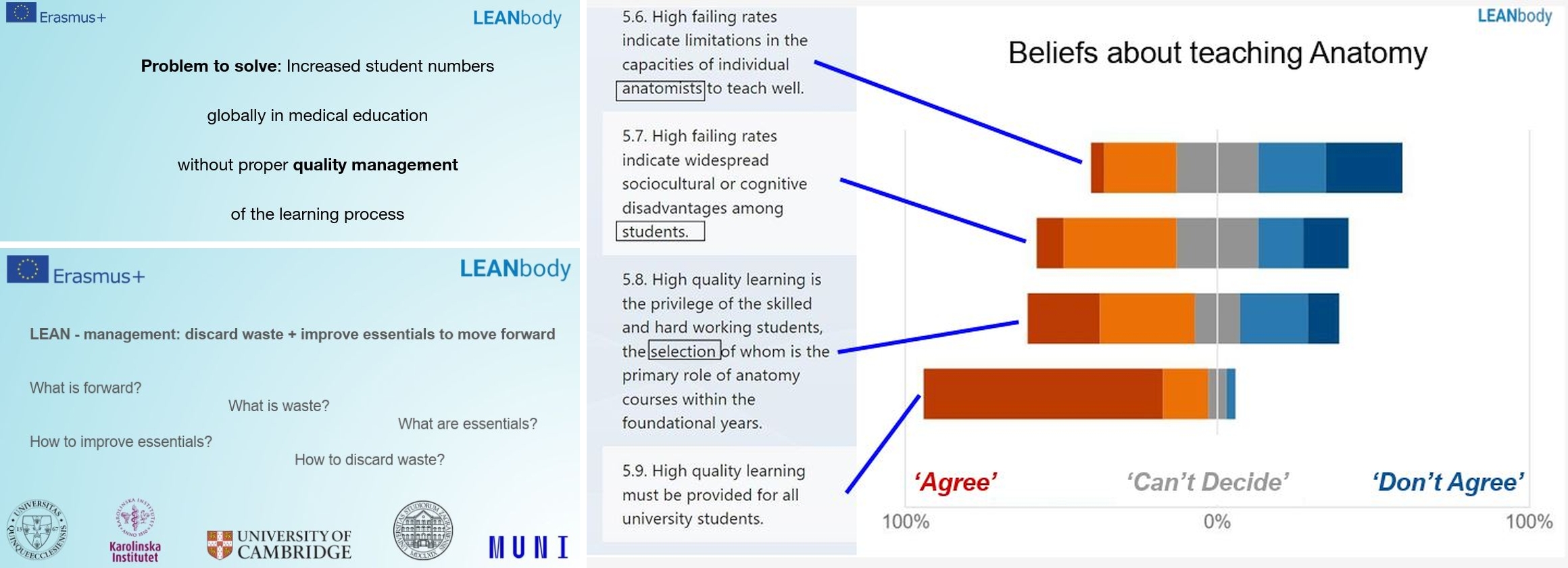LEANbody Topics

What topics is this website about?
To guide you, we see your professional development as a force for positive change in medical education. Based on the Needs Analysis of this project we have set up supporting materials and tools to enhance the quality of your teaching in the dissection room. As an anatomist of an English language medical program, you regularly face situations where you are expected to assess in English the behaviour of your students both inside and outside the dissecting room. Our TOPICS attempt to answer the following question: what skills, competences, values and attitudes do you need as an anatomist to help the professional development of your international students to live and work as competent doctors in the world today?
We performed a rigorous literature review on each of these topics. Findings of our analysis you can check out by clicking on the topics below:
TOPIC 1 - Global Standards in Medical Education
TOPIC 2 - Professionalism in Teaching and Learning Anatomy
TOPIC 3 - Teaching Traditions in Anatomy
TOPIC 4 - Modern Pedagogical Frameworks in Anatomy
TOPIC 5 - Mental Health Management in Anatomy
Who has developed these learning materials?
Each partner university was responsible for coordinating the analysis as follows:
TOPIC 1 - University of Pécs;
TOPIC 2 - Masaryk University,
TOPIC 3 - University of Zagreb,
TOPIC 4 - Karolinska Institute,
TOPIC 5 - University of Pécs.
Our analysis examined the professional role of anatomists, their historical contributions, and how they delivered value in the past and could deliver value in the present, from epistemic, psychological, sociocultural, and economic perspectives. Our analysis focused on Central European anatomists and anatomy course organizers from Hungarian, Czech, and Croatian medical schools. A training program covering the above topics was developed, informed by globally recognized anatomists and scholars from Cambridge University and Karolinska Institutet. These experts brought excellence and international expertise to the project, equipping participants with critical knowledge tailored to the anatomy profession. This knowledge was then adapted to the unique needs of anatomists, aided by a workshop collaboratively designed by the project coordinator, a leading clinical anatomist from Cambridge University, and educational developers from Karolinska Institutet.
Further details of our analysis can be found in the preprint of our manuscripts which we have submitted to peer review educational journals for publication.
How to use our learning materials?
In a lifelong learning perspective, you can implement some of our recommended strategies and good teaching practices in your local anatomy traditions. We offer you four levels of engagement to meet your professional development needs about each of our topics:
Navigate freely through the TOPICS and TOOLS menus of our website, focusing on specific needs you are already aware of as an experienced anatomist or course director of anatomy courses.
Follow the LEANbody Roadmap we have put together to help you identify strengths and weaknesses within your own teaching routine. Based on your self-assessment results you can now navigate freely through the TOPICS and TOOLS menus of our website to look for relevant best practices and find concrete tips and tools for enhancing your teaching routine.
STEP 1. You will start with a short quiz of 10 questions to explore your core beliefs about what high quality means in teaching Anatomy. This quiz will reveal if you intuitively or consciously resonate with any of the worst myths in higher education that have already been debunked by the scholarship of higher education.
STEP 2. Next, detailed self-reflective tools (with >150 survey questions in total, ~30-40 questions in each survey) will guide you through the thinking process about state-of-art principles and standards around topics 1-5.
STEP 3. Analysis of your results in each of your self-assessments will reveal existing strengths in your thinking patterns around LEANbody topics. It is helpful to start with facing your strengths in detail.
STEP 4. Next, you will identify existing gaps in your beliefs, attitudes, and practice considering contemporary teaching standards by continuing the analysis of your survey responses.
STEP 5. You will pick and choose those contents from TOPICS 1-5 that are relevant to your newly identified weak spots.
After STEP 5 repeat STEP 1. If your learning was effective, your scores should increase.
Download and use the LEANbody Guidebook for more guidance in an accurate self-assessment process. The Guidebook is free to download and it contains useful hints on how to use each of the LEANbody self-assessment tools.
- Enroll in our freely available Teacher Training Course for a learning experience with greater depth about the LEANbody topics. This course is free, self-paced, and online. We guide you through all LEANbody surveys and topics step-by-step. We are using all the resources we created during the LEANbody project which are otherwise not fully available through the project website. This includes survey data about the assessment of our local traditions, case reports, testimonies, and many more relevant and helpful documents.
